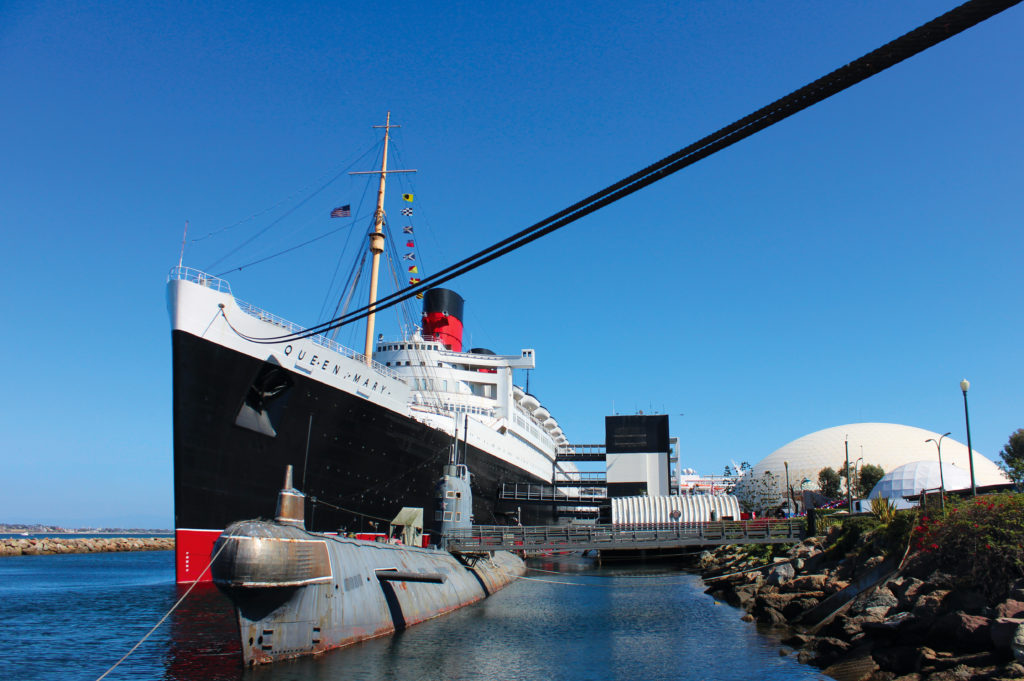The City Auditor’s office is looking into the financial statements of the Queen Mary’s operator to reconcile that data with the company’s statements to the investment community to ensure that the company is financially sound and capable of meeting its lease and maintenance agreements with the city.

“The iconic Queen Mary has for generations been a significant and meaningful part of our City’s history, but the ship has gone through some very challenging times,” said City Auditor Laura Doud as she announced the sixth audit of the Queen Mary’s operations. “This latest audit is a continuation of our work to ensure good stewardship of this historical asset.”
The announcement of the audit followed news reports questioning the profitability of Urban Commons, the company that currently holds a 66-year lease to operate the ship and to develop the surrounding area. Negative publicity was at least in part responsible for the plunging stock price of the company’s Eagle Hospitality Trust shares, which are traded on the Singapore Stock Exchange, and which were pulled off the exchange temporarily.
“In light of the initial public offering (IPO) on the Singapore Stock Exchange by Urban Common’s Eagle Hospitality Trust, the audit will reconcile the audited financial statements and the financial information contained in Eagle Hospitality Trust’s investor prospectus related to the Queen Mary,” Doud said in a news release.
Doud said the audit will be conducted in partnership with an outside forensics accounting firm.
The announcement followed a series of events in recent months that included the revelation of losses in 2018, as well as concerns about the pace at which restoration and maintenance projects were taking place.
Taylor Woods, Urban Commons principal, told the Business Journal that different financial terminology used in the prospectus and in the audit might have led to confusion about the company’s financial performance.
“We believe there may have been a misunderstanding with the terms Gross Operating Profit, or GOP, which is a common term used in the hospitality industry and ‘total profit.’ GOP does not take into account certain non-operating and non-cash expenses that contributed to the negative net income for 2018, together with the renovation disruption to operations,” Woods said. “It is common for a property to have positive GOP and negative net income, and the figures provided in both reports are consistent.”
Company officials said that some of the issues that affected its earlier financial performance have already been addressed.
A series of shutdowns during 2017 and 2018 cost the operation significantly in terms of revenues, they said. During that period, costs associated with renovations and operational disruptions totaled more than $23 million. For example, the ship’s popular Ghost and Legends tour and the five-star Sir Winston’s Restaurant & Lounge were both non-operational for a significant period of time during renovations and thus unable to generate revenues.
Both were operational in 2019, and the ship’s management also joined with event promoter Goldenvoice to hold more concerts at the ship in 2019, which helped generate revenue as well as increasing parking lot profits.
Woods was quick to note that since Eagle Hospitality has resumed trading its stock, the per-share price has stabilized and the company is pushing forward with plans to continue renovating the ship and maintain and develop the area.
“Urban Commons has implemented a perpetual funding mechanism to ensure the longevity of the ship, ensuring an adequate amount per year toward repairs, expected to continually increase thanks to an agreement between Urban Commons, the City and Carnival Cruise Line,” he told the Business Journal. “We are happy to observe Eagle Hospitality Trust’s share price has increased more than 25%, to 0.56 USD, over the past six weeks.
“We are confident in the financial well-being of Urban Commons Queensway, LLC, and its ability to perform under the terms of the lease agreement with the City of Long Beach. Since taking over the lease of the Queen Mary in 2016, we created a preservation program that has facilitated nearly $29 million in improvements – far more than any previous owner. These major renovations were started in 2017 and continued throughout 2018, which significantly impacted income during that time period. Urban Commons is proud of its long-term partnership with the City of Long Beach on the iconic Queen Mary. We are committed to doing what is best for the Queen Mary and the city.”
During his 2020 State of the City address on January 14, Mayor Robert Garcia spoke endearingly about the ship, including its history as a luxury liner turned World War II troop transport. However, he acknowledged the failings of the city and past operators in the preservation of the historical landmark, which has led to its current state of disrepair.
To rectify past mistakes, Garcia announced that Urban Commons has committed to three new initiatives that aim to improve the well-being of the Queen Mary. First, the firm will provide the city with a study within 60 days on the ship’s economic impact on Long Beach and the region, to be conducted by Beacon Economics; second, Urban Commons will develop a historic preservation blueprint over the next 90 days that maps out renovation and critical repair projects, and will be open to the public; lastly, the company will present revised plans to the city and public for its proposed 40-acre Queen Mary Island development.
“In the past, operators have been interested in turning a profit on the Queen Mary, but I have been convinced that this strategy alone will not work. Why? We have 50 years of history telling us so. Moving forward, the Queen Mary first and foremost must be treated as a significant historical location worthy of public investment,” Garcia said during his address. “The Queen Mary is part of this city and she isn’t going anywhere.”
Senior Writer Brandon Richardson contributed to this story.
